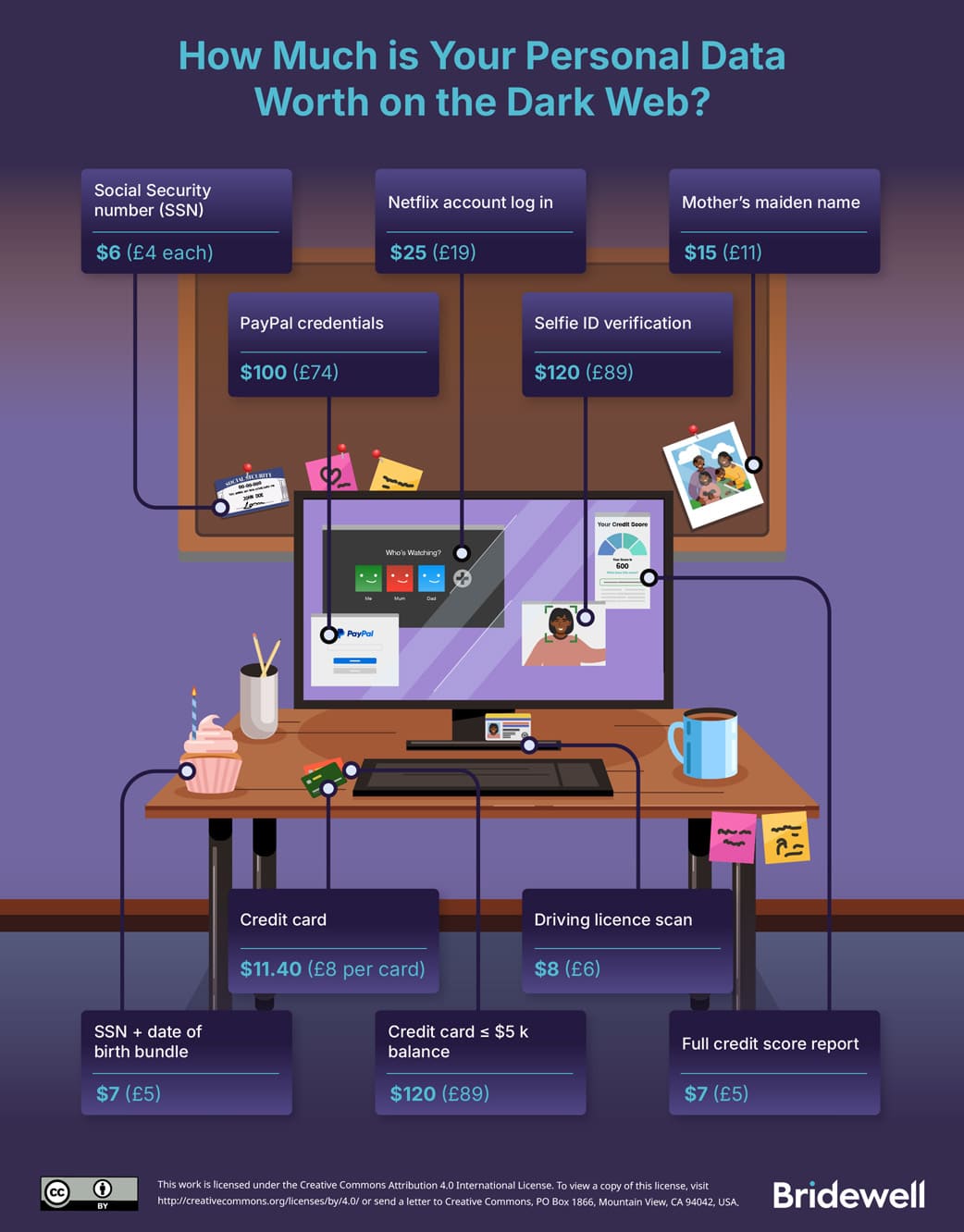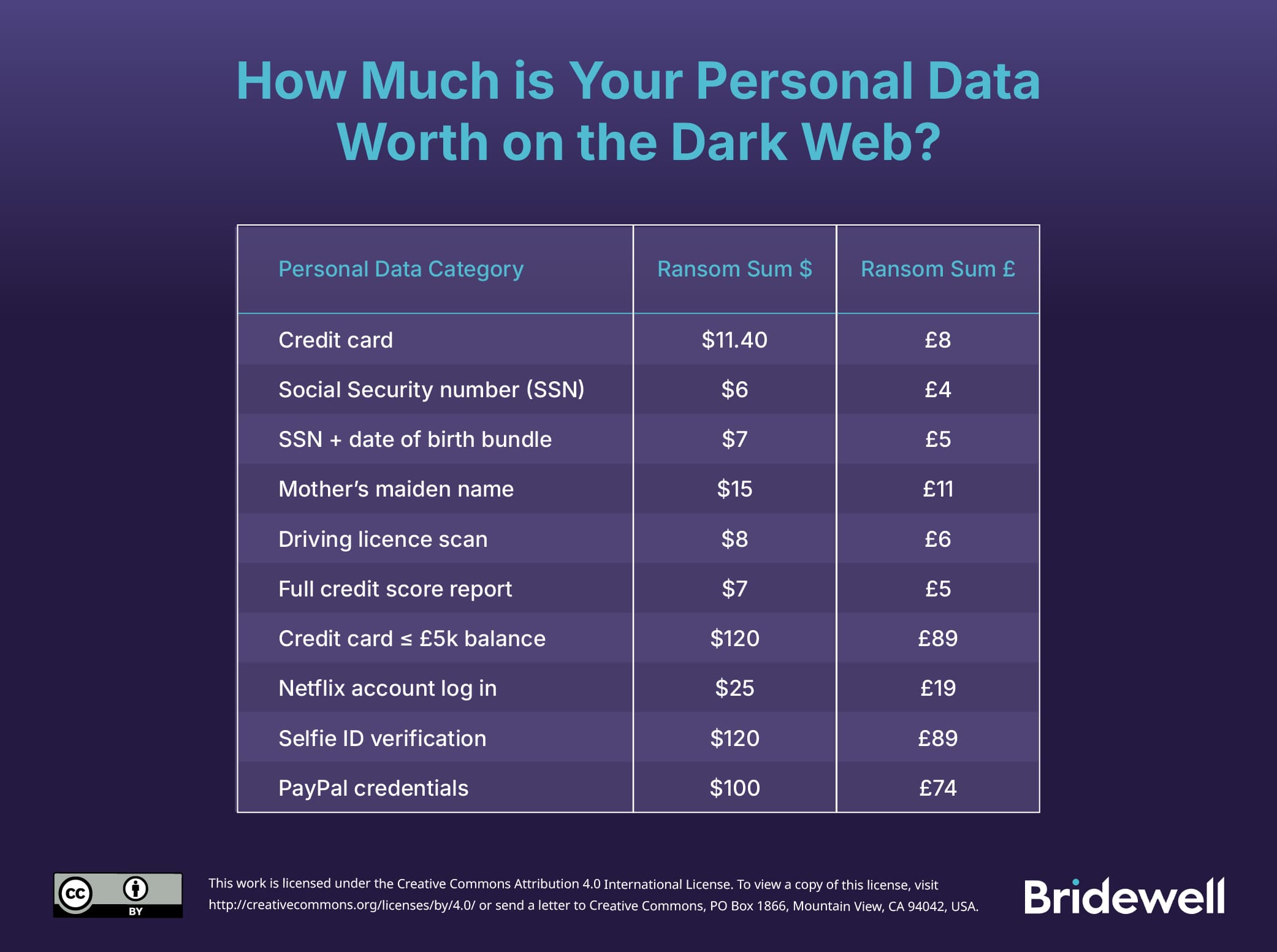
Millions of Brits now save their personal data online as an everyday convenience, whether entering their full name and date of birth to log into social media accounts quickly or storing bank card details and passwords across multiple websites to make online shopping easier.
As digital interactions increase, so does the risk of exposing sensitive information to cyber criminals. Personal data can be sold on the dark web for a low price, and many people are unsure what steps to take if their data is compromised.
We commissioned a survey of 1,000 nationally representative participants in the UK in October 2025 and revealed nearly 72 percent of respondents do not know what to do if their information is traded on the dark web. This underlines a significant knowledge gap that puts many at risk of identity theft, fraud and further exploitation.
The Cost of Data on the Dark Web is Shockingly Low

The cost of personal data on the dark web varies significantly depending on the type of information but personal details could be sold for as little as £5. Research has found that credit card details cost around £8 on the dark web, while a scan of a driver’s license could cost around £6.
Given that data is often bought in bulk on the dark web and resold many times over, these prices may reflect the upper value of this data with some data being available at much lower cost. Attackers can get real value by linking multiple records together, such as date of birth, passwords and mother’s maiden name. The slightly more expensive data includes a mother’s maiden name (£11) and a working Netflix subscription (£19).
Higher value information, such as a credit card with a balance of more than £5,000 can be purchased for £89 while a selfie of a user holding their ID, which is typically used for account verification can also cost around £89. Verified PayPal credentials could cost a little over £70 on the dark web. Credentialed access and a pre-verified balance or reputation (PayPal, crypto wallets, selfie-IDs) typically fetch higher values on the dark web as these reduce the criminal’s time-to-cash-out.
Brits Aren’t Confident in their Cyber Cecurity Preparedness
In the survey of 1,000 Brits, it was revealed that more than 50 percent of people aged 35 and over would not be sure what to do if their data were found on the dark web. Those aged between 25 and 34, are the most confident, with 46 percent stating they would know what to do if their data were leaked on the dark web.
However, the data reveals that younger generations aren’t necessarily more confident in what to do, as just 32 percent of those under 25 admitted they’d know what to do if their data was found on the dark web.
The data highlights a significant regional divide in cyber security awareness, with certain areas showing high levels of uncertainty about what to do if personal data is found on the dark web. The cities with the highest percentage of people unsure of the next steps are:
- Norwich: 88 percent
- Leeds: 84 percent
- Plymouth: 81 percent
In contrast, these are the cities with the highest percentage of people who are sure of what the next steps are:
- Manchester: 35 percent
- London: 34.9 percent
- Nottingham: 34.6 percent
However, this data still reveals that most residents are unsure what to do if their data is found on the dark web.
Online Data Habits in the UK
The survey data shows how easily people save personal data online. Only 19 percent of respondents save no personal data online, whether on a tech device, cloud storage, or an app. Around 27 percent of people over the age of 55 report that they have not saved any personal data online, but this percentage drops among younger generations. Only nine percent of people aged 25 to 34 report never saving personal data online.
The data most commonly saved online includes:
- Full name and date of birth: 26 percent
- Login details for social media: 23 percent
- Bank card details: 22 percent
While these details are most often saved online, there are some outliers. 26 percent of those aged between 25 and 35 said that their work or employer details, such as a payroll ID or employer email, are online.
What to do if Your Data is Found on the Dark Web:
- Identify the problem: Use reputable breach-check tools such as Have I Been Pwned to see if your email or credentials have appeared in known data breaches, while Google’s Dark Web Report can identify if your personal details have appeared on the dark web.
- Update passwords immediately: It’s best to update your passwords immediately if you find out your details have been involved in a data leak or appeared on the dark web. A good password is ideally completely random, with no personal details included. Consider opting for three random words that are memorable to you. Avoid words like password or qwerty or consecutive numbers like 1234, as these are most commonly used.
- Set up a password manager: Using unique passwords that are sufficiently complicated across many accounts makes it difficult to remember each password, which means many people use the same password across multiple accounts. Rather, set up a secure password manager to manage all passwords. A password manager can also notify users that a password has been involved in a data breach.
- Set up 2FA: It’s best to add an extra layer of security where possible. Even if a password is stolen, two-factor authentication can prevent unauthorised access to accounts.
- Monitor your credit score regularly: You can monitor your credit score regularly through credit reference agencies like Equifax or Experian. If you notice any new accounts you didn’t apply for your can contact the lenders directly to report the issue.





